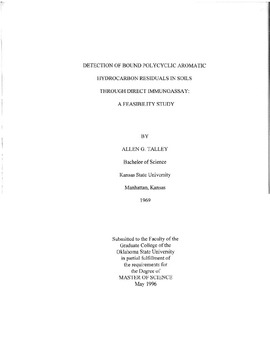| dc.description.abstract | Environmental immunoassay is the use of animal-derived antibodies that will specifically bind with targeted analytes, called antigens, to quantitatively measure levels of contamination of the analyte in the environment. Most commercially available forms of immunoassays require the analyte to be in solution. Therefore, for soil contaminants, the analyte must be extracted from the soil, usually by a strong solvent, prior to analysis. The potential inefficiency of the extraction process has led to the investigation of a method for direct detection in the solid phase. This project deals strictly with testing potential assay procedures using monoclonal antibodies specific to naphthalene and polyclonal antibodies specific to pyrene. These antibodies were developed by Strategic Diagnostics, Inc. (SDI) under ajoint agreement with Amoco Production Co. (APC). The testing of the antibodies for their ability to bind to the targeted analyte in solution and their cross reactivity, or ability to bind with other similar polycyclic aromatic hydrocarbons (PAR's), were tested exclusively by SDI, and only the results of these tests are discussed in this thesis. Dextran, a chain of sugar molecules, was used as a surrogate antibody in establishing procedures. This was done because the newly developed antibodies used in this study were available in very small quantities. There would be few chances for adjusting procedures and re-testing, and careful preparation for testing was crucial. | |
